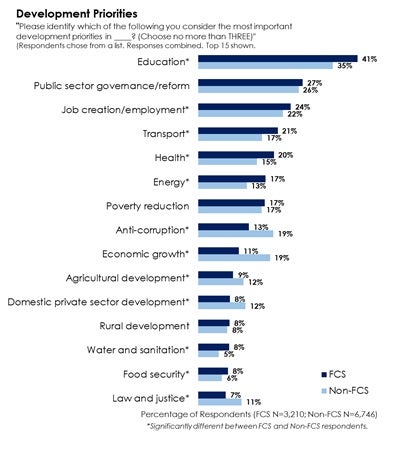In the past year, attention has focused on the World Bank Group's (WBG) work in fragile and conflict affected states (FCS) in two distinct ways. First, the Independent Evaluation Group released its report on the work of the WBG in these countries. Second, within this first year of change at the WBG, Fragility, Conflict and Violence is identified as one of the five thematic groups that cut across the development efforts of the institution. The FCS team, aims, among other things, to ensure a mainstreaming and strategic approach in all fragile states.
There is little doubt that, with more than 1.5 billion people living in countries affected by violent conflict, and with around twenty percent of the world’s poorest people living in fragile and conflict-affected situations (FCS), achieving the twin goals of ending poverty and boosting shared prosperity will have to require progress not only in middle income or even lower income client countries, but also in the most vulnerable client countries.
How much do the opinions of the WBG’s stakeholders in fragile countries differ from those in non-fragile countries? In some cases, quite a bit. But in many cases common ground exists. Is this true when comparing opinions in FCS countries in Africa versus other parts of the globe?
One helpful navigational tool is the WBG Country Survey Program, which provides data from annual polls with opinion leaders (across government, media, private sector, civil society, academia, bi and multi laterals), in approximately one third of the institution’s client countries. Thanks to the program, every three years we hear from stakeholders in nearly all client countries on matters related to development priorities, obstacles to reform, the work, relationships, behaviors of Bank staff and officials, access to the internet, interaction and engagement.
Between July 2013 and July 2014 (FY 14), surveys were conducted in 13 countries designated “FCS” by the WBG (nearly 3,000 opinion leaders offered their views). 29 surveys were conducted in non-FCS countries.
What are some of the findings worth considering for World Bank Group country teams, as they prepare their Strategic Country Diagnostics and Country Partnership Frameworks? And beyond this institution, how can these public data guide development leaders working in these countries?
Let’s start with the perceived state of the state…
Over the past year, opinion leaders in fragile and conflict affected states were more optimistic about their countries’ futures than stakeholders in non-fragile countries. The Country Survey data suggest that while 64% of respondents in FCS states said their countries were moving in the right direction, only 51% agreed in non-FCS countries.
Why care about the level of optimism in a country? When it comes to development and reform, it is far easier to build partnerships for reform amongst key opinion leaders if they believe that the environment is an enabling one for reform. If they are feeling more negative, they might be much less likely to jump on board.
When reflecting on what is perceived to slow down or stop World Bank supported reform in their countries, similarities between respondents in FCS and non FCS countries emerge. For instance, FY 14 Country Survey research suggests that pluralities of stakeholders across the board worry most about the inadequate level of citizen participation (up significantly since FY 13), followed by lack of capacity in government (up significantly since FY 13), the adequacy of the thinking behind reforms (up significantly), and the WBG’s sensitivity to political/social realities on the ground (up significantly).
How responsible is the Bank Group perceived to be, when there is stalled/slow reform? In FY 14, opinion leaders in both FCS and non-FCS countries are far less concerned about how fast the Bank Group is and donor coordination than about the political issues detailed above. But a quarter of respondents in FCS countries believe the Bank Group’s “follow up” can be blamed.
Getting down to business: Perceived development priorities. The data suggest much overlap between stakeholders in FCS and non FCS countries, when it comes to perceived development challenges and priorities:
But within the FCS universe of countries there’s a nuanced narrative. It turns out that respondents in FCS countries in the AFR region (7 countries) are significantly more concerned about energy and transport this year than their counterparts outside the region (6 countries), and less concerned about education (although it’s still the top development priority for both).
Stakeholders in FCS countries consistently emphasize energy and transport more than their peers in non-FCS countries throughout the survey data. For example:
How does the Bank Group fit within the three themes that emerged consistently across FCS countries, capacity building, development priorities, and citizen engagement? Briefly…
On capacity building the FY 14 data are clear: Respondents identify it as one of the two most valuable WBG activities (right behind financial resources) and they regard it as effective an instrument in reducing poverty in their countries, as they do investment lending.
When thinking about alignment, where would Bank Group support in sectors have the most impact according to poll respondents? Education and agriculture/rural development have remained consistently at the top of the list. This year health and governance have increased in importance as areas for Bank Group emphasis. When considering The Bank Group’s comparative advantage with other donors – more than half of respondents identify public financial management as an area that would benefit most from Bank Group involvement. Jobs follows, then access to basic services and capacity of state institutions. Other donors’ value derives from its work in areas of dialogue, justice, improving livelihoods and jobs and basic services.
Finally a plurality of stakeholders in both FCS non-FCS countries reported that in order to make itself of greater value the WBG needs to reach out more to groups outside of government (in particular, private sector, local government and NGOs). This aligns comfortably with the overall view of the importance of more citizen engagement/participation.
Note: All Country Survey data and more are available on the WBG’s external website: http://countrysurveys.worldbank.org.




Join the Conversation